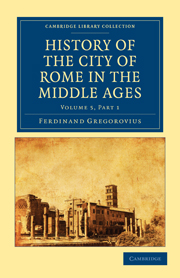CHAPTER V
Published online by Cambridge University Press: 04 April 2011
Summary
Gregory IX. remains in exile
Gregory IX. had already spent a year in exile in Tuscany, and in spite of the peace he remained two more years in banishment. It would have been impossible for him to have enjoyed a moment's repose in Rome. Elements of hatred and strife were sufficiently abundant, and were fanned by Frederick in order to weaken the Pope's relation to the Lombard league. The Emperor had been summoned to Germany in the summer of 1235 by the revolt of King Henry. Here his misguided son surrendered himself a prisoner; and here, on July 15, Frederick married his third wife, Isabella of England, and thereby allied himself with the power which had been the support of the Guelfs. When after a year's sojourn in Germany he had successfully set in order the affairs of the country, he assembled his army at Lechfeld, near Augsburg, in June 1236, and returned through the Tyrol to Italy to punish the Lombards. He stood at the summit of his power. “Italy,” he wrote to the Pope, “is my heritage, as is well known to the whole world.” This haughty saying of the Emperor was a manifesto which revealed his rejection of the principles adopted at Constance and Eger. Frederick wished to transform the entire peninsula into his monarchy.
Frederick II. begins the war against the Lombards
His patience was exhausted. Tedious negotiations, in which the Pope invariably showed himself on the side of the Lombards, had only increased the defiance of the cities.
- Type
- Chapter
- Information
- History of the City of Rome in the Middle Ages , pp. 181 - 228Publisher: Cambridge University PressPrint publication year: 2010First published in: 1897

